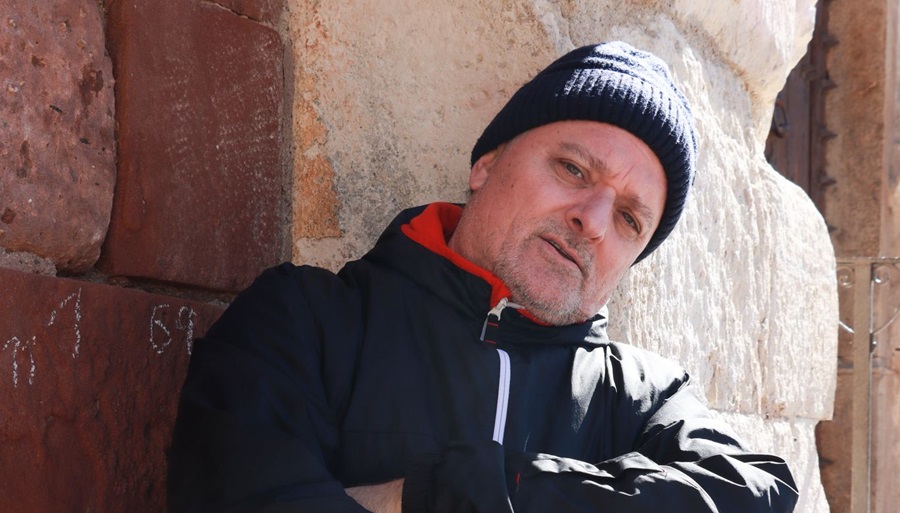- Face to face
- 9 de April de 2025
- No Comment
- 10 minutes read
Toni Albà: “Effort is what makes up for luck, talent, and good fortune”

FACE TO FACE WITH
Toni Albà, actor
Toni Albà: “Effort is what makes up for luck, talent, and good fortune”

With Toni Albà – widely known for his impersonations of the king on Polònia and other shows – we are linked by several curious facts that few would ever suspect, and which will soon come to light over the course of this interview. Among these are palaeontology and human evolution, not to mention a shared friendship with journalist Joan Ignasi Ortuño, and even ancestral roots in villages near the Alt Camp region. He’s from Aiguamúrcia and I’m from Vila-rodona – both of us connected to this corner of Tarragona. So many common origins, so many coincidences, certainly call for a Face to Face with this giant of Catalan comedy.
When did you first discover your love for the stage?
I began my acting journey in my hometown of Vilanova i la Geltrú, performing in productions like Els Pastorets at the Cercle Catòlic de Vilanova. I loved being on stage. But it was at 15 when I joined an amateur theatre group, rehearsing three days a week. So, my formal acting training began at El Timbal between 1979 and 1980, with classes like mime.
And how did things develop in your later teens?
I started attending the Institut del Teatre while finishing secondary school. I had a great time. I was mad about comedy.
“My formal acting training began at El Timbal between 1979 and 1980, with classes like mime”
But one has to be brave to reach new heights. What did you do that time?
At 19, I left for France to perform a mime drama with five musicians. When we finished, a man with a strong Tortosa accent approached me – always addressing me formally – and said, “Next year, you’ll be opening the Sitges Festival”.
And who was that character?
That man was none other than Ricard Salvat, a great figure of Catalan theatre. And so, in 1983, I made my debut at the Sitges Theatre Festival. Soon after, and encouraged by Ricard Salvat, I moved to Paris to study mime at the École Internationale de Théâtre Jacques Lecoq, where I trained until 1985.
What do you know of Ricard Salvat now?
A few years ago, a secondary school student came to do a project on theatre and chose to interview me. When I asked who her tutor was, fancy that – it was Ricard Salvat. I went to visit him not long after and found his office full of papers and theatre posters – one of them, hanging on the wall, was from the mime drama that had first brought us together. A few years later, the dear man passed away.
I see you founded the group Dram Bakus with two classmates from your Paris school: Bruno Delahaye from Normandy and Kevin Magill from Canada. Together you presented the comedy show Opération Fu! in 1986. After ten seasons touring half the world and six hundred and fifty performances, what did you do next?
I directed Brams o la kumédia dels herrors in 1987, a comic piece parodying the final rehearsals of Shakespeare’s Richard III, starring a very young Sergi López.
You never worked with La Cubana, but that play seems to have brought you quite close to them.
Absolutely – at the premiere, Jordi Milán, director of La Cubana, was in the audience. After the show, he told me that if Sergi López weren’t so young, he’d have signed him on the spot. That same Sergi López who later built a film career in France.
You worked with Andreu Buenafuente on various programmes and TV channels. Who else did you share the screen with back then?
David Fernández, Santi Millán, Edu Soto, Jordi Ríos, and the brilliant Mònica Pérez.
The one who plays Infanta Cristina on Polònia1?
Exactly. An underrated actress in this country, though she’s also a remarkable writer.
Too right! – I’ve had the pleasure of interviewing her for a Face to Face on Educational Evidence. With so many comedy colleagues, it all feels very Polònia, doesn’t it?
Even more so with the play La Família Irreal, performed alongside the Polònia team. That time – and every day – was packed with anecdotes. We had an absolute blast performing it. It was like saying: “what mischief are we going to get up to on stage today?” I’d often improvise, leaving many of my fellow actors in stitches.
But that play was a bit of a delicate matter, given it dealt with the King of Spain. Any calls from Zarzuela Palace?
Well, I’d been impersonating the King since 2002 and that play came out in 2012. That said, one day, I was talking with politician Xavier Trias, who told me an unbelievable anecdote. Apparently, the Count of Almansa, former head of the royal household, got in touch with Trias, complaining that the King was being impersonated every week. The Madrid press was full of headlines like “mockery and scorn towards the King of Spain”. So, the Count insisted something had to be done. Trias met with TV3, the Government, and others to make a decision and…
Go on – what was the outcome?
Trias rang the Count of Almansa and told him:
– “As for the issue of the King being impersonated weekly? Consider it dealt with”.
– “Oh really?”
– “From now on, it’ll only be every each other week” – and then he hung up.
And regarding the Catalan independence process – have you faced any legal proceedings?
All resolved. All cases dismissed.
“One day, some students asked me what they had to do to become famous, and I told them that wasn’t the right question”
Looking back on your long comedy career, what does the word ‘effort’ mean to you?
Effort is what makes up for luck, talent, and a fortunate star. You have to work hard to achieve what you’re passionate about. One day, some students asked me what they had to do to become famous, and I told them that wasn’t the right question. They should be asking themselves what it takes to perform good theatre and strive for excellence.
And you, Toni – what were you like as a student back then?
If I liked the subject, I did well. If not, I was pretty average.
What subjects did you enjoy?
Science – especially palaeontology and human evolution. I wanted to be a biologist. I loved La Vida y la Tierra2 by Rodríguez de la Fuente. Ethology fascinated me.
What advice would you give students today?
To work hard for what they’re passionate about. To make the most of each day. To value that carpe diem they’ve been given. And to reflect on life, understanding that one day it all ends – and even more so if you haven’t made the most of it through effort and dedication. I tell my two kids – aged 18 and 16 – the same thing: I can’t be their friend, but I can be a father who guides and pushes them to become good people.
Can you tell us about an upcoming project in your comedy career?
A cheeky play whose title says it all: 50 Daños de Memocracia.
Toni, through this chat I’ve come to know an actor who doesn’t just do comedy – he lives and teaches truth through performance. Perhaps we’ll meet one day at Abric Romaní3, discussing human evolution – or perhaps involution. I’ll leave it here.
___
1 Polònia is a Catalan TV3 comedy show that satirises national and international politics through impersonations of key political figures
2 It was a Spanish nature documentary series that explored the natural world, wildlife, and environmental conservation through the lens of the iconic presenter’s passionate storytelling.
3 Abric Romaní is an archaeological site located in the Catalan Pre-Pyrenees
Source: educational EVIDENCE
Rights: Creative Commons


